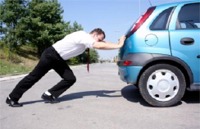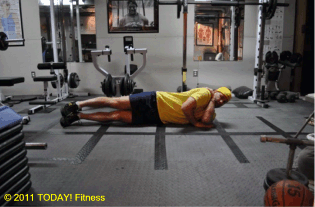Before Exercise

Just as you put fuel in your car before you take it for a drive, you want to put fuel in your body before you exercise. This preexercise snack or meal will help energize your workout. Preexercise fuel has four main functions:
- It helps prevent hypoglycemia (low blood sugar) and its symptoms of light-headedness, needless fatique, blurred vision, and indecisiveness - all of which can interfere with top performance.
- It helps settle your stomach, absorb some of the gastric juices, and ward off hunger.
- It fuels your muscles, with both carbohydrate that you eat far enough in advance to get stored as glycogen and carbohydrate that you eat within an hour of exercise, which enters the bloodstream and feeds your brain.
- It gives you the peace of mind that comes with knowing your body is well fueled.
Yet many people purposefully exercise on empty because they believe that exercising without having eaten beforehand enhances fat burning. True, but they assume that by burning more body fat, they will lose more body fat. False. To lose body fat, you need to create a calorie deficit by the end of the day. Whether you burn carbohydrate or fat is of less importance. The truth is you'll be able to exercise harder and burn more calories if you eat a preexercise snack. The harder exercise might contribute to the desired calorie deficit.
Many people are also afraid that preexercise food will result in an upset stomach, diarrhea, and sluggish performance. Of course, eating too much of the wrong kinds of foods can cause intestinal problems, but embarking on an exercise session when you are underfueled certainly results in sluggish performance. Morning exercisers who work out before breakfast, in particular, need to be sure they have fueled themselves adequately.
During Exercise
Just as what you eat before you exercise greatly affects your energy levels, so does what you eat during and after extensive exercise. Students who practice after-school sports from 3:30 to 5:30, businesspeople who work out at a health club from 5:30 to 7:00 p.m., marathoners who train for one to two hours, and others who exercise for more than 60 minutes need to think about fueling during exercise. Unfortunately, many of these folks are in such a rush to start their workouts that they fail to bring with them the foods and fluids that will enhance their exercise efforts.
Ideally, during extensive exercise that lasts for more than 60 minutes, you should try to balance your water and energy output with enough fluid to match your sweat losses and enough carbohydrate to provide energy and maintain normal blood sugar level. You can significantly increase your stamina by consuming about 100 to 250 calories (25 to 60 g) of carbohydrate per hour while performing endurance exercise, after the first hour.
After Exercise
When you deal with the rigors of a tough training schedule, remember that what you eat after a hard workout or competition affects your recovery. For the serious athlete, foods eaten after exercise require the same careful selection as the meal before exercise. You should not separate your recovery diet from your daily diet. By wisely choosing your foods and fluids both right after you finish exercising and throughout the day, you will recover as best as you possibly can for the next workout.
If you are a recreational exerciser who works out three or four times per week, you need not worry about your recovery diet because you have enough time to refuel your muscle glycogen stores before your next workout. You should be more concerned about your recovery diet if you are a competitive athlete, instructor, or someone who does two or more workouts per day.
Your muscles break down during a hard workout, but you can stop the breakdown mode by eating as soon as tolerable after you exercise. You'll be taking advantage of the 45-minute postexercise window of opportunity to optimally nourish, repair, and build muscles. Refueling is beneficial in two ways:
- Carbohydrate stimulates the release of insulin, a hormone that helps build muscles as well as transports carbohydrate into the muscles to replenish depleted glycogen stores.
- Carbohydrate combined with a little protein (approximately 10-20 g) creates an even better muscle refueling and building response, and it reduces cortisol, a hormone that breaks down muscle.
Even if you aren't hungry or have a hard time tolerating postexercise food you should still plan on eating. You don't need to consume a lot of food. As few as 100 calories can make a big difference.
Whether you can manage a snack, an energy bar, or some other alternative... keep in mind these nutrition basics so that you can keep your energy high and recover faster to maximize your workouts. Every little bit helps!
Ref: Nancy Clark's Sports Nutrition Guidebook



